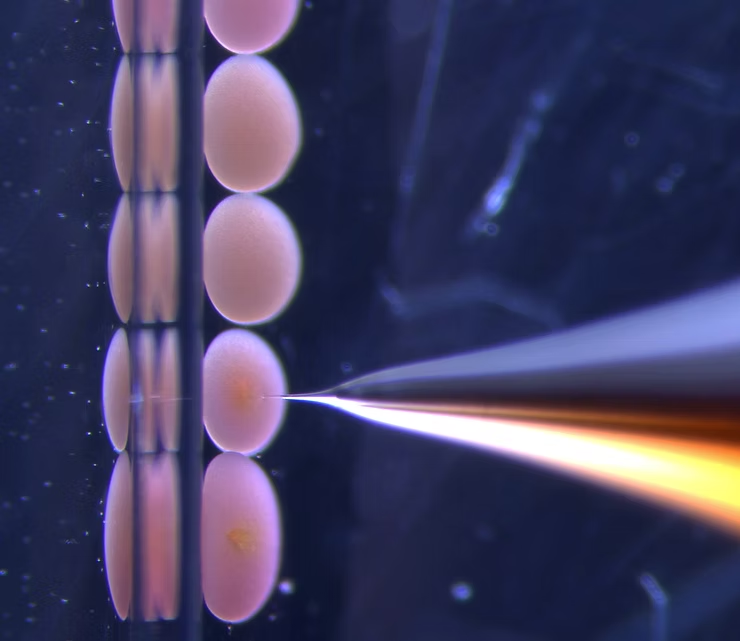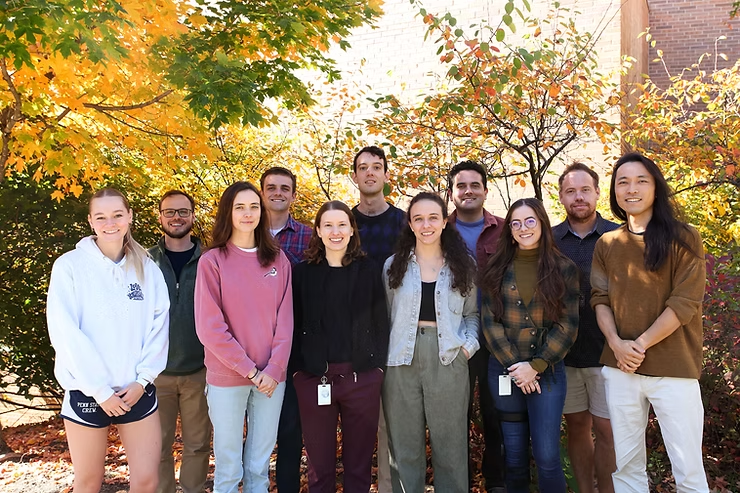New Faculty Profile
Phillip Cleves: Studying microbes to combat climate change
By Kirsten Mickelwait

Many scientists first identify a research focus while already on their academic path, finding a specific problem that needs solving through an iterative process. Phillip Cleves (MCB PhD 2015) flipped that scenario: Having grown up in Oklahoma and earned his BS in Arkansas—both landlocked states—he read a paper about the deterioration of coral reefs, and the symbiosis between coral and the algae that provide them with food and color. That problem took hold of his imagination and never let go; he was soon headed to the Great Barrier Reef in Australia, where he began his quest to understand this serious impact of climate change.
In January 2026, Cleves will return to MCB as an assistant professor of Genetics, Genomics, Evolution, and Development (GGED), after five years as a PI at Carnegie Science in Baltimore, MD.
When first reading about the symbiotic relationship between coral and algae, “I thought it was so bizarre,” he says. “It broke most of the central tenets I’d learned in my cell biology classes but, as I progressed in my career, I realized that this kind of interaction between animals and microbes is pretty common.”
While earning his PhD in MCB from the lab of Craig Miller, Cleves learned that molecular biology was undergoing a kind of revolution in which scientists can tackle nature’s and biology’s grandest inquiries. Most of that research has focused on questions of human biomedicine, like the cause of cancer and the spread of viruses. But, during his doctoral study, he realized that molecular biology can also be used to study fundamental questions about how ecosystems respond to climate change.
The idea that there’s an animal fed by photosynthetic algae growing inside it still gives him goosebumps, Cleves says. “This process is so successful that it builds ecosystems that can be seen from space. But, over the course of my career, we've seen an increasing collapse of these ecosystems due to the breakdown of that symbiosis.”
Corals are immensely important organisms, supporting about 25% of all known marine life. It’s estimated that, since 1950, the earth has lost more than half of its coral reefs due to increased marine temperatures that cause coral bleaching—the process in which corals expel the symbiotic algae that feed them, eventually starving the organisms. Cleves’ research could help develop tools to repair existing reefs, as well as prevent or predict their future destruction.

Employing an integrated approach using both corals and a model system for coral biology—the symbiotic anemone Aiptasia—the Cleves Lab studies how intracellular, beneficial microbes invade and persist in animal cells to form symbiosis, thereby gaining key molecular insights into the destruction of coral reef ecosystems due to ocean warming.
The lab has also been genetically modifying corals. Using CRISPR gene-editing technology, they’ve been able to spawn corals to create reproductive colonies and mutate genes to better understand the genes that are important for symbiosis. “Because of the revolution in gene-editing, we have the potential to make almost any organism experimentally tractable, which opens new, exciting avenues for biology,” he says.
While Cleves’ work is foundational, the connection between ecology and biomedicine implies translational potential. Because there's so much evolutionary conservation of these pathways from humans to corals, the context of this beneficial host-microbe interaction could lead to important discoveries that are biomedically relevant, he says.
The Cleves Lab is trying to understand what happens to animal cells when they take up microbes. When are microbes beneficial? When do they lead to pathogenesis, causing diseases like malaria or toxoplasmosis? Beneficial microbes are a hot topic these days, Cleves says, because they’ve been found to be of great importance to the human gut, skin, and other tissues. By studying the coral and algal relationship, the lab is gaining insights into not only disease, but also the broader ecosystem. “Some of the biggest breakthroughs in biomedical science have come from studying the ocean and aquatic organisms,” he says.

Cleves is particularly excited to be returning to MCB, where such connections are already being explored. “Berkeley has a long history of doing research with all sorts of non-traditional model organisms that have been shown to be immensely powerful for understanding biomedical, evolutionary, and ecological questions,” he says.
He also has fond memories of MCB’s scientific rigor. “The intellectual engagement of the department is unparalleled,” he says. “Its scientific productivity and rich research environment create a unique and amazing culture. I loved this culture when I was a PhD student, and I’m happy to be returning to it.” He’s also excited to be coming back to the Bay Area, with its robust opportunities for collaboration—from the California Academy of Sciences to Stanford University, even UC Berkeley’s own Gump Station for marine research in Moorea.
Cleves is also excited to share his love of the scientific process with MCB students at both the undergraduate and graduate levels, and feels that his own experience as a grad student here will be a strength. At this writing, he was setting up his new MCB lab with some of his researchers from Carnegie Science, as well as building a state-of-the-art coral facility in Koshland Hall.
Scientific rigor, a collaborative culture, and cutting-edge resources will all help to advance his unique research angle. “It's going to give us an unprecedented capacity to use genetic editing and study what genes do in corals,” he says. “Ultimately, we hope to find the exact genes that will help coral survive climate change, while learning new fundamental biology for use in biomedicine and beyond.”
Learn more about research in the Cleves Lab here.
Banner image: Galaxea fascicularis coral, Cleves Lab
Back to Main Fall 2025 Newsletter Page





